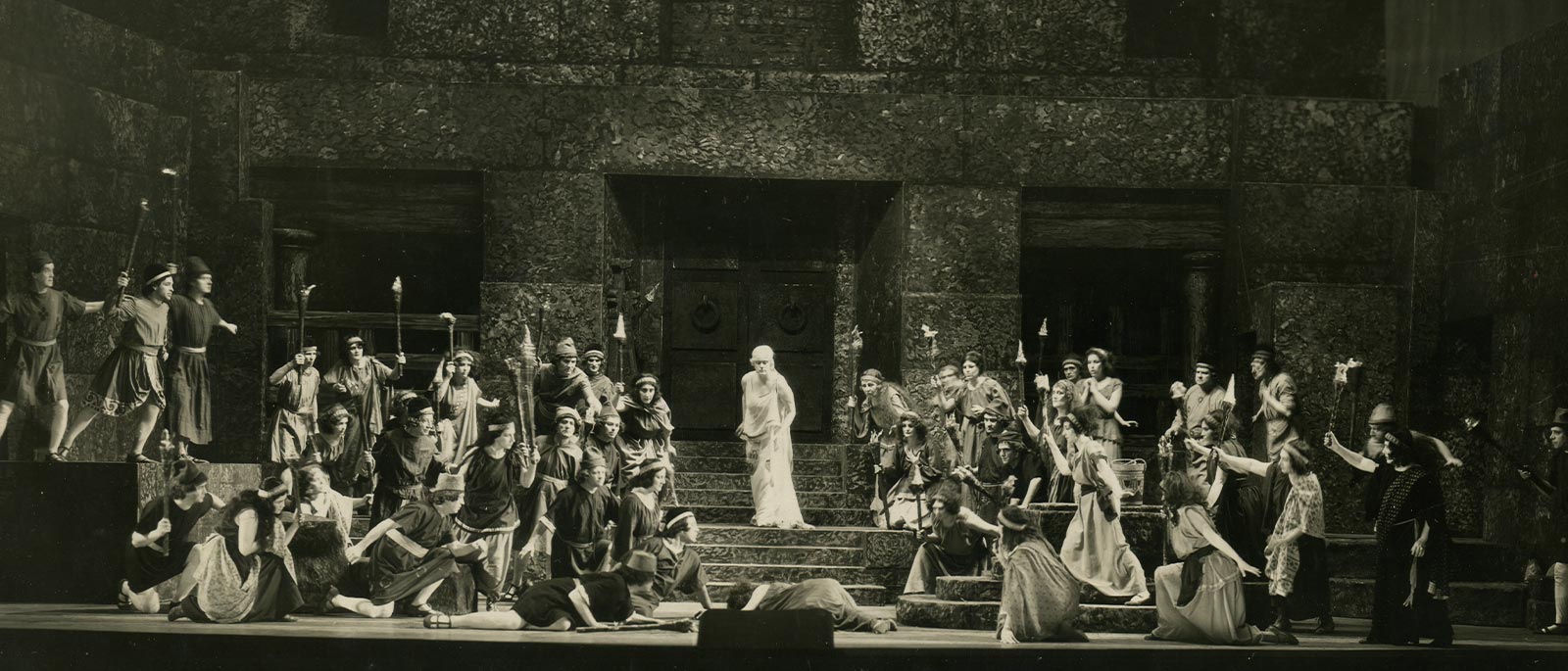
From the Archives: Elektra at the Met
The operas of Richard Strauss got off to a rough start at the Metropolitan in 1907, when the composer’s Salome created one of the greatest scandals in the company’s history. Salome’s mixture of eroticism with a biblical story, and in particular the involvement of a cherished Christian saint, John the Baptist, went too far beyond the bounds of propriety for puritanical America. The box-holders who owned the opera house forbade Salome’s presentation after the first performance.
Naturally, future administrators were hesitant to schedule more Strauss. His Der Rosenkavalier, safely set in 18th-century drawing rooms, was unobjectionable enough to have a Met premiere in 1913 and subsequently enter the repertory on a regular basis. But it alone among Strauss’s operas held a permanent place at the Met. In 1928, his Die Ägyptische Helena was given for a single season as a vehicle for the Viennese star Maria Jeritza, but was not heard again until 2007.
Elektra, the next opera Strauss composed after Salome, premiered in Dresden in 1909 and finally made it to the Met in 1932. Like Salome, Elektra is a dramatically sizzling one-act personality sketch of a depraved, demented woman, though its source is classical Greek rather than biblical. At the Met premiere (pictured at the top of this page), the score was given a potent reading by Artur Bodanzky, principal conductor of German repertory, with Gertrude Kappel (pictured above) in the title role. “Strauss’s Elektra Creates a Furor—Vast audience at Metropolitan cheers for 15 minutes” ran the headline of the New York Times review. So began the rehabilitation at the Met of the century’s greatest German opera composer. The following season, Salome returned as well.
In revivals of Elektra during the 1930s, it was generally presented as part of a double bill with a comic one-act work. Rossini’s Il Signor Bruschino, Puccini’s Gianni Schicchi, and Menotti’s Amelia Goes to the Ball were the most frequent partners.
As the success of Elektra depends largely on an inspiring conductor and a dramatic soprano who can sustain the extraordinary demands of the lead role, its inclusion in the Met repertory has depended largely on the presence of appropriate artists. Conductor Fritz Reiner and soprano Astrid Varnay (pictured above) gave a now-famous series of performances in 1952. The revival of 1961 brought the interpretation of German soprano Inge Borkh to the Met. But the new production of Elektra in the company’s inaugural season in the Lincoln Center opera house cemented the opera’s place in the audience’s affections by featuring the artists most associated with Strauss’s work at the Met. Swedish soprano Birgit Nilsson possessed a potent, penetrating voice that rode easily over the huge orchestral climaxes of the piece. Her searing interpretation was abetted by the galvanizing Chrysothemis of Leonie Rysanek and the impressive Klytämnestra of Regina Resnik, all under the baton of dynamic young conductor Thomas Schippers. (The trio of singers is pictured below in a 1966 rehearsal.) Their collaboration was so successful that it was repeated the following season, and again in 1970, with the same three women but with the eminent Straussian Karl Böhm on the podium. Nilsson and Rysanek then returned in their respective roles a decade later with James Levine conducting, an event documented in a gripping live telecast.
The 1966 production by director Herbert Graf and designer Rudolf Heinrich was replaced in 1992 by a new production directed by Otto Schenk, with James Levine conducting and Hildegard Behrens in the title role. Leonie Rysanek was again in the cast, but now in the mezzo-soprano role of Klytämnestra, and the budding young dramatic soprano Deborah Voigt (pictured below with Behrens) took the role of Chrysothemis. A quarter century later, Elektra was given a widely heralded new production featuring Swedish soprano Nina Stemme in the title role, Finnish conductor Esa-Pekka Salonen, and a production by French director Patrice Chéreau, who passed away before the Met premiere.
While the total number of performances of Elektra to date at the Met is only 114, its reputation as a thrilling music drama requiring exceptional artistry marks each presentation as an important musical event.